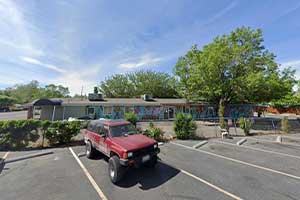Skip To Rehab Listing
Alcohol and Drug Rehab Settings and Modalities in Nixon, Nevada
Alcohol and drug addiction has an effect on people of all genders, ages and walks of life. The drug and alcohol rehabilitation programs and services, such as short term drug rehab programs, detoxification centers, inpatient drug rehab centers, long term addiction treatment centers, outpatient individual counseling, are designed to offer excellent care to anyone who struggles with addiction, no matter their personal circumstance.
Addiction treatment programs in the Nixon area are not all the same. They offer a variety of modalities, including 12-step facilitation approach, group therapy, cognitive/behavior therapy, trauma-related counseling, cognitive/behavior therapy, contingency management/motivational incentive, that enable clients to face their addiction in the way that is most beneficial for them.
Special Services for Substance Abuse Recovery
Despite the prevalence of substance abuse, each person who struggles with drug and alcohol addiction problems has their own specific circumstances that need a personalized strategy. That is why the treatment centers in Nixon offer several special resources such as housing services, transgender or (LGBT) clients, self-help groups, legal advocacy, substance abuse education, persons with post-traumatic stress disorder.
Rehab Payment Options
Clients and their loved ones should not postpone recovery because of worries about money. Rehabs offer various possibilities for payment, such as the following: private pay, private health insurance, medicaid, medicare, payment assistance, access to recovery (atr) voucher, other state funds. Alcohol and drug treatment facilities can direct clients and their loved ones toward the payment options that will put rehabilitation within their reach.
Individuals who struggle with drug and alcohol dependency should not hesitate to take advantage of the various resources accessible in Nixon.
Commonly Asked Questions about Addiction and Treatment
What are some tips for remaining drug free?
Remaining drug-free, especially after overcoming addiction, is a challenging journey. However, with a strong commitment, support system, and coping mechanisms in place, it's definitely possible. Here are some tips:
- Professional Help: Ongoing professional help is crucial, even after you've stopped using drugs. This could involve individual counseling, group therapy, medication, or other forms of treatment recommended by healthcare professionals.
- Support Network: Build and maintain a strong support network. This could include sober friends, family, mentors, or support groups who understand your journey and provide emotional assistance.
- Healthy Lifestyle: Regular exercise, a balanced diet, and ample sleep are all important for maintaining your physical health, which in turn, can support your mental health and resilience.
- Mindfulness and Stress Management: Practices such as meditation, yoga, and breathing exercises can help manage stress and cravings. They can also promote self-awareness, helping you recognize and deal with triggers before they lead to relapse.
- Hobbies and Activities: Engaging in new activities or rekindling old hobbies can help fill time previously occupied by substance use. They can provide a sense of purpose and enjoyment, reducing the desire to use drugs.
- Set Goals: Setting both short-term and long-term goals can provide a sense of purpose and direction. Goals can be related to your career, education, personal development, or other areas of interest.
- Avoid Triggers: Identifying and avoiding situations, places, or people that trigger the desire to use drugs is essential. If avoidance isn't possible, develop coping strategies to deal with these triggers.
- Continuous Learning: Educate yourself about addiction and recovery. Understanding the process can empower you and give you insight into your own journey.
- Positive Self-Talk: Maintaining a positive attitude and practicing self-compassion can help you deal with moments of doubt or guilt.
- Practice Accountability: Stay accountable to yourself and others. This can involve regularly checking in with your support network, attending recovery meetings, or working with a sponsor or mentor.
What is the Cognitive Behavioral Method for treating addiction?
"The Cognitive Behavioral Method, or Cognitive Behavioral Therapy (CBT), is an evidence-based psychological approach for treating addiction that focuses on identifying and modifying dysfunctional thought patterns, beliefs, and behaviors that contribute to substance use disorders. CBT is grounded in the understanding that an individual's thoughts, feelings, and behaviors are interconnected, and by changing maladaptive thought patterns and behaviors, they can better manage their emotions and reduce their reliance on addictive substances.
CBT for addiction treatment typically involves the following key components:
- Identifying triggers: The first step in CBT is to help individuals recognize the situations, thoughts, or emotions that trigger their substance use. This awareness enables them to develop strategies to manage these triggers effectively and avoid relapse.
- Challenging negative thoughts: CBT helps individuals recognize and challenge irrational or negative thoughts and beliefs that contribute to their addiction. By examining the evidence for and against these thoughts and replacing them with more balanced, rational alternatives, individuals can better control their emotions and behaviors.
- Developing healthy coping strategies: CBT focuses on teaching individuals new, adaptive coping skills to deal with stress, cravings, or negative emotions without resorting to substance use. These strategies may include relaxation techniques, problem-solving skills, assertiveness training, or time management, among others.
- Building self-efficacy: CBT helps individuals build confidence in their ability to cope with high-risk situations and resist the urge to use substances. This increased self-efficacy can contribute to long-term recovery and reduce the likelihood of relapse.
- Relapse prevention: CBT incorporates relapse prevention techniques to help individuals identify early warning signs of relapse and develop a plan to address these signs effectively. This may involve practicing coping strategies, seeking support from others, or making adjustments to their environment or daily routine.
CBT for addiction treatment can be delivered in individual, group, or family therapy settings and is often used in conjunction with other treatment modalities, such as medication-assisted treatment (MAT), peer support groups, or motivational interviewing. CBT has been found to be effective in treating various substance use disorders, including alcohol, opioid, and stimulant addiction, as well as co-occurring mental health disorders, such as anxiety and depression."
How does drug addiction affect the family unit?
Drug addiction can have far-reaching consequences not only for the individual struggling with substance use, but also for their family unit. Family members may experience various emotional, social, and financial challenges as a result of a loved one's addiction. Some of the ways drug addiction can impact the family unit include:
- Emotional strain: Family members may experience a range of emotions, such as fear, anger, frustration, guilt, and sadness, as they grapple with their loved one's addiction. These emotions can be overwhelming and may lead to mental health issues, such as anxiety or depression, among family members.
- Family dynamics: Drug addiction can alter family dynamics, leading to increased conflict, mistrust, and communication breakdowns. This may result in a dysfunctional family environment and strained relationships among family members.
- Role changes: Family members may be forced to take on new roles to compensate for the challenges brought on by the addiction. For example, a spouse or older child may assume additional responsibilities for managing the household, providing financial support, or caring for younger siblings.
- Neglect of responsibilities: The individual struggling with addiction may neglect their responsibilities as a parent, spouse, or sibling, leaving other family members to bear the burden of these responsibilities.
- Financial strain: The costs associated with obtaining drugs and potential job loss due to addiction can place a significant financial burden on the family. This may result in debt, inability to meet basic needs, or even homelessness.
- Legal issues: Family members may face legal problems as a result of their loved one's drug-related activities, such as theft or drug possession. Legal issues can create additional financial strain and emotional stress for the family.
- Safety concerns: Drug addiction can expose family members to unsafe situations, such as violence, drug-related criminal activities, or the presence of dangerous substances within the home.
- Impact on children: Children in families affected by drug addiction may experience emotional, behavioral, and developmental challenges. They may be at greater risk for academic difficulties, mental health disorders, and substance abuse themselves later in life.
- Social isolation: Family members may become socially isolated due to stigma, shame, or fear associated with their loved one's addiction. This can lead to a loss of support networks and further emotional strain.














